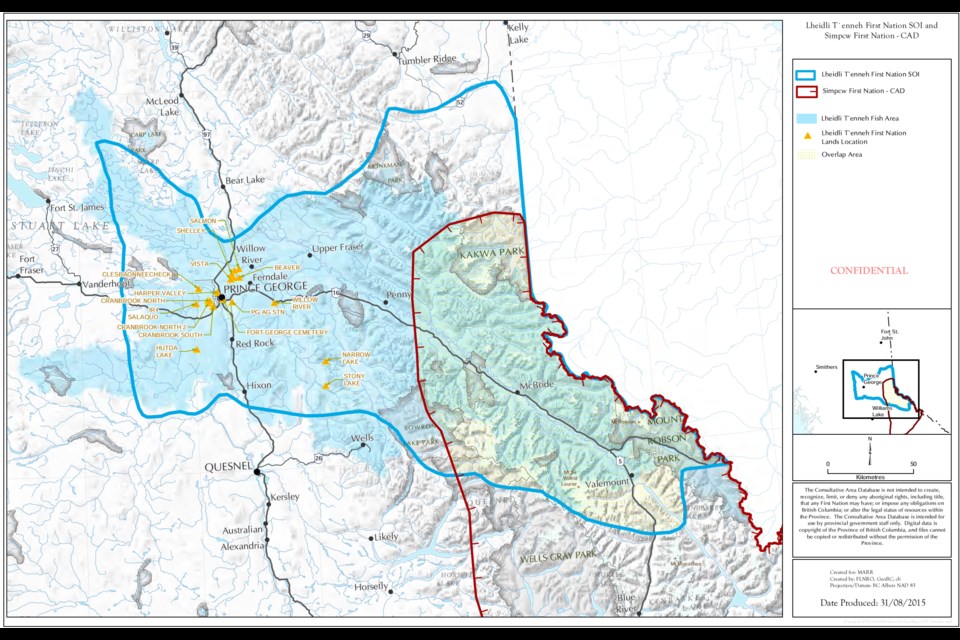Two First Nations say a tentative treaty agreement between the Lheidli T'enneh and the federal and provincial governments would encroach upon their traditional territory.
Both the McLeod Lake Indian Band and the Simpcw First Nation have issued statements critical of the proposed treaty, which will go before a vote of Lheidli T'enneh members from June 16-23. Simpcw First Nation Chief Nathan Matthew has raised questions about the historic relationship of the Lheidli T'enneh to some of these lands between McBride and Valemount. The McLeod Lake Indian Band also addressed an open letter to the Lheidli T'enneh expressing dismay over what they described as a "lack of consultation" in relation to areas of the agreement within their territory.
A signing ceremony was held on Saturday to mark the agreement between the Lheidli T'enneh and the provincial and federal governments. The agreement would see 4,300 hectares of land come under Lheidli T'enneh ownership, and would see the nation receive a $37 million capital transfer. The Lheidli T'enneh would also maintain traditional hunting and fishing rights for a large area extending along the Fraser River from Prince George to Valemount.
But Simpcw First Nation Chief Nathan Matthew said the concerns of his nation need to be addressed before the Lheidli T'enneh treaty can proceed. He said the Lheidli T'enneh have not presented his nation with evidence of traditional ties to land claimed by the Simpcw.
"If they had information and just showed it to us - saying these are our village sights, we hunted here - if they could give us evidence of that, we'd sit down and say 'good, now we have something to talk about.' But they've never done that," Matthew said.
Matthew said the agreement between the Lheidli T'enneh, the provincial government and the federal government is inconsistent with the principles of reconciliation and with the United Nations Declaration on the Rights of Indigenous Peoples.
"Under Secwepemc law, it is Simpcw's responsibility to protect our homelands, and our fish, wildlife and plants for future generations. Before this treaty is finalized, any encroachment on our lands, waters and resources, must be resolved," Matthew said.
McLeod Lake Chief Harley Chingee also wrote an open letter addressed to the Lheidli T'enneh Nation. He raised concerns about overlap of territory between the proposed agreement and McLeod Lake traditional territory as defined in Treaty 8.
"Not only does the ratification of this agreement disregard the language set out to protect the McLeod Lake traditional territory, the lack of consultation demonstrates the unwillingness of the Lheidli T'enneh Nation, as well as the provincial and federal government, to reach an agreement between both nations in regards to the overlap," Chingee wrote.
The proposed Lheidli T'enneh treaty does contain provisions relating to overlapping land claims.
A handout prepared by the nation said the agreement allows for changes to the agreement if a court finds the agreement negatively affects the land rights of another nation.
"We already have formal shared territory arrangements with some of our neighbouring First Nations and will continue to develop others with those who are willing. We have also been careful to not select treaty settlement lands in remote areas that have unresolved competing claims," states a hand-out prepared by the Lheidli T'enneh Nation.
According to handouts prepared by staff of the Lheidli T'enneh, the proposed treaty agreement draws a distinction between land that would be fully owned by the nation and land upon which the nation would maintain traditional hunting and fishing rights.
Land owned by the nation would allow the Lheidli T'enneh to pursue economic activity, such as agriculture, forestry and oil and gas exploration.
Under the agreement, areas that are traditional hunting and fishing grounds, which extend over areas claimed by both the Lheidli T'enneh and the Simpcw, would allow members to harvest fish and aquatic plants for food, social and ceremonial purposes. Commercial fishing would be governed by a separate harvest agreement, which would allow for commercial licenses governed by Canadian fisheries laws.
Hunting would be allowed throughout the year in these areas, although a licensing regime may be set up by the Lheidli T'enneh Nation. Regulations governing commercial hunting and conservation would be worked out in future agreements between the province and the Lheidli T'enneh.



